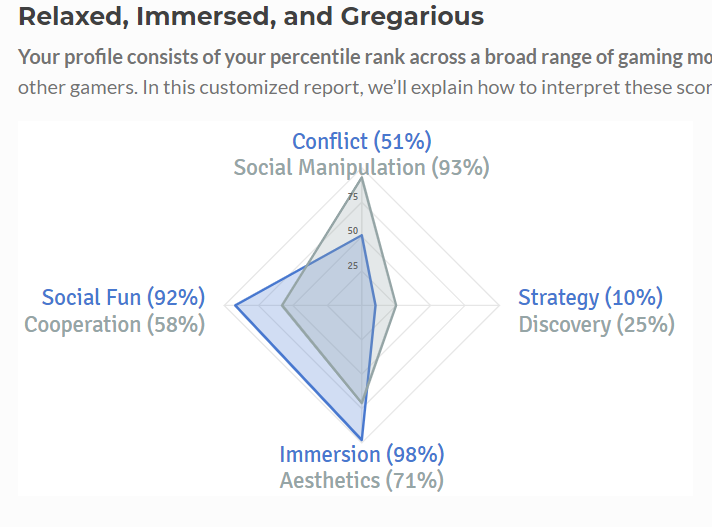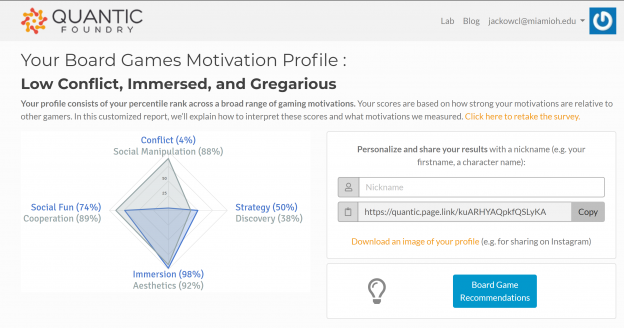
While I personally have played video games far more than I’ve played board games, I certainly still do enjoy board and tabletop games. As such, I was interested to see just how my results for Quantic Foundry’s Test, a test that analyses my motivations for playing board games, might compare to my interests when playing video games. Alongside this, I was also interested in whether the results of this test would match the kind of gamer that I personally think I am when it comes to board games, or if there would be some discrepancy between the kind of board game player I personally believe I am and the kind of board game player the test believes I am.
Quantic Foundry’s Test analyzed my motivations for playing board games based upon four main categories, Conflict, Strategy, Immersion and Social Fun. To begin this analysis, I would like to take a look at my score for Strategy specifically, and its subcategory: Discovery. For the Strategy category as a whole, I scored a 66%, but for the Discovery subcategory I only scored a 15%. At first glance, this seemed very odd to me, as I initially thought that this score was referring to games where discovering something was a main element of its enjoyment. When it comes to the video games I play, I very much enjoy games with large worlds to explore, such as The Legend of Zelda: Breath of the Wild or Hollow Knight, as finding every nook and cranny of a world is very rewarding to me. However, as I continued reading my results I realized that this was not referring to my interest in an aspect of a game, but rather my interest in seeking out new games to play. As such, I believe this low Discovery score actually fits me quite well when it comes to board games, as I have a tendency to return to games that I have played before or share games I’ve enjoyed with others rather than searching for new board games to play. That is not to say that I will not try new board games at all, as just recently I played a deckbuilder game called Dominion for the first time, but when given the option I have noticed that I gravitate more towards games that I am already familiar with.
However, my Discovery score is not the only score that I am interested in analyzing, as I believe that my score for Conflict, and its subcategory Social Manipulation are quite interesting as well. For my Conflict score, I received a 65%, while for Social Manipulation I received a 21%. Personally, this makes sense to me, as I consider myself quite bad when it comes to games that involve bluffs or deceit. It’s not that I don’t enjoy them, as games like Werewolf and Coup are still quite enjoyable, but I often find myself losing relatively early on as I simply do not have the skills needed to hide my intentions or detect other’s hidden intentions. The relatively high Conflict score also makes sense to me, as I find that it can be hard to be motivated in a game you are losing if there is no real way to affect the other players. If one player has simply been dealt a better hand, or just has generally more experience with the game, there needs to be some way to fight against that advantage to make the game enjoyable to the other players, which to me means that some form of direct conflict in board games is needed if the game is not a cooperative effort.
Overall, I feel that Quantic Foundry’s test has done a good job of revealing just what interests me in board games, and possibly even in video games as well. While discovering new board games to play may not be as important to me as having board games that I enjoy playing, games that themselves revolve around discovering new and interesting things in their worlds are still quite interesting to me. Alongside this, my relative lack of skill in deceit and bluffing tends to push me away from social manipulation games, even though I do find that conflict is an important part of board games. And while I did not specifically touch on them, I do find that my scores for Social Fun and Immersion make sense as well, as having fun is ultimately the goal when playing a board game, and a game’s art and world alone.



